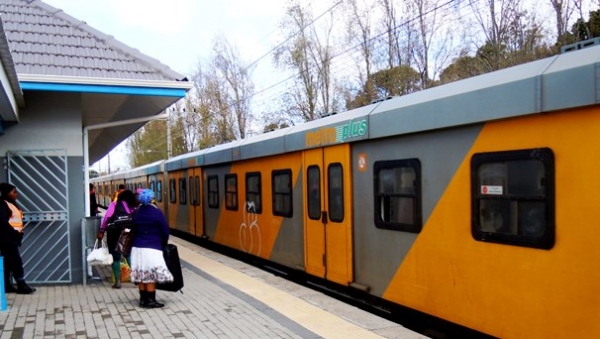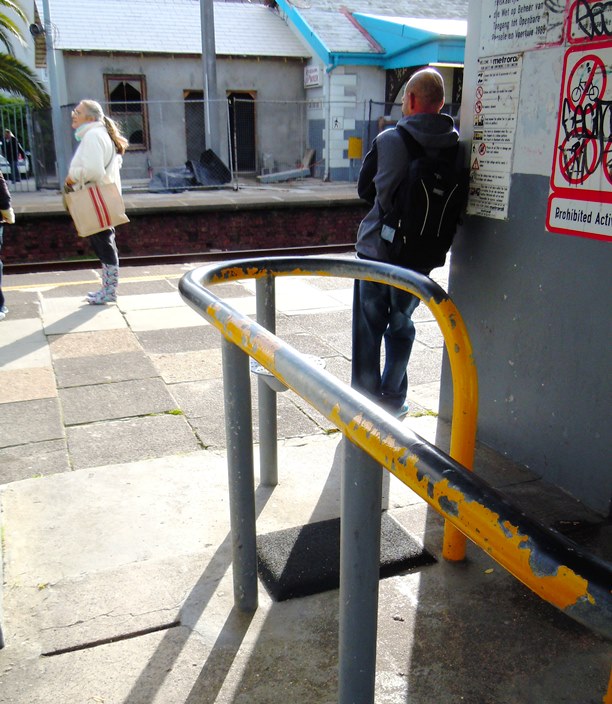Taking your life in your hands on Metrorail

In the past year, 394 incidents of crime on trains were reported in the Western Cape according to Metrorail. “We are losing lives on overcrowded and dangerous trains,” said Cosatu Western Cape provincial secretary Tony Ehrenreich last week at the launch of its Section 77 application to Nedlac relating to train transport in the Western Cape. A lack of security on the trains is a key concern of the campaign.
Cosatu has announced that its 220,000 Western Cape members will strike if its concerns are not addressed. The strike action is against Metrorail, Prasa, the national government, the Western Cape government, the City of Cape Town, and the Cape Town Chamber of Business and Industry.
Cosatu’s insistence on Prasa providing adequate security to commuters hinges on a 2004 Constitutional Court landmark case, Rail Commuters Action Group and others versus Metrorail and others.
In the case, Metrorail argued that the South African Police Service (SAPS) bears the primary responsibility to ensure the safety of commuters, an argument that the applicants strongly refuted.
The court found that Metrorail, which was then a business within Transnet and is now a branch of Prasa, was in fact obliged to “ensure that reasonable measures are taken to provide for the security of rail commuters whilst they are making use of rail transport services”. In spite of the ruling, crime on trains is still rife with an average of 33 crimes reported every month over the past year according to statistics provided by Metrorail to GroundUp.
Many commuters have stories to tell about robberies and assaults on trains, sometimes where the robbers threatened passengers with knives and guns. These experiences appear to indicate Metrorail’s non-compliance with the 2004 ruling.

The area where a guard is supposed to check tickets stands empty at Rosebank station on the Southern line. Photo by Ashleigh Furlong.
Inadequate security on trains was once again under the spotlight after a gang of men wielding knives robbed a carriage full of commuters between the Retreat and Steenberg stations in Cape Town on 22 July. Michael Weber was one of the commuters who were robbed.
“I got onto the train from Cape Town to Fish Hoek at 6:15pm,” said Weber, “As usual I had my laptop out and was busy with work.”
When the train arrived at Retreat station about six men boarded the train.
“I immediately got the sense that these guys were trouble and started packing my laptop into my bag, when one of the guys came up to me with what looked like a large chef’s knife. My first reaction was to stand up, which must have taken him by surprise as he then swore at me and attacked me with the knife. I was able to bring my laptop bag up to my chest in time so that the knife went into the bag containing the laptop. He then took the bag and ran down the carriage isle,” explained Weber.
Weber then moved to the next carriage to avoid further confrontation and when the train stopped at Steenberg station the robbers ran off.
“There was no security on the train at any stage of the journey and also no one at the Retreat and Steenberg stations. I am aware that we unfortunately live in a country where this type of thing has become common place, but I do feel that commuters on Metrorail trains are sitting ducks as there is no escape once the train is moving,” said Weber.
Jasper Schoonraad, who is a crewing agent at Marine Crew Services SA, has witnessed and experienced numerous actual and attempted robberies on trains in the Western Cape. One of the latest incidents was last month, when two men stole his phone and attempted to steal another woman’s tablet [computer], which Schoonraad prevented by chasing after one of the robbers and punching him in the head, causing him to drop the stolen tablet. Despite this, the robbers still managed to get away with Schoonraad’s phone.
Schoonraad’s mother took to Facebook to vent her frustration. “Time for a petition and a commuters’ march,” she wrote. “Not everyone can afford to drive to work, and besides the roads can’t even handle the traffic load, not to mention the dearth of parking in the CBD. City of Cape Town, in the interests of the economy and environment, we demand reliable, clean and safe public transport!”
Just two weeks ago, Schoonraad witnessed a handbag being snatched from a woman. “Her boyfriend and I ran after the guy and the train started leaving without us. We had to run after it and hop onto a moving train. There were security (guards) on the train as well as the platform. They didn’t even get the train to wait for us,” he said.
In a 2013 incident, Schoonraad prevented a man with a gun from robbing an elderly woman of her bag and wedding ring.
Another commuter, Cailyn Shepherd, who takes the Southern line every day, said that two months ago someone with a gun climbed onto the adjoining carriage to her at Steenberg station and attempted to rob people. “Thank goodness I got off at the next stop,” she said.
“I have only ever seen security twice on the trains in the last two years. And both times, it was in the morning and they were sleeping, taking up all the seats,” said Shepherd in correspondence with GroundUp. “We got told our price increases are going up to pay for more security. I have not seen one person since then. Metrorail is a joke and pathetic.”
Commuter Lusanda Mangale said that passengers are complaining daily about the conditions on the trains.
“There is no security. The trains are always running late and we pay a lot of money,” she said. She said that she didn’t mind paying increased train fares if the service on trains was improved.
The recent fare increase saw single tickets increasing between 50 cents and R1, weeklies between R1 and R2, and monthlies between R2 and R38, depending on travel zone and class.
Mangale, who has been held up at gunpoint on the train, said that what little security one may find on lines such as the Southern line, is non-existent in Khayelitsha. “We need some security or police (on the trains); at least some protection,” she said.
Mangale’s sentiment was echoed by Ehrenreich. On Thursday, he said that the railway police were being deployed by SAPS to other areas. “The railway police must be reinstated,” he said.
Other improvements that Ehrenreich mentioned were the need for panic buttons to be installed on trains and guards to be present in every carriage. The number of individuals who entered trains without tickets and armed with weapons was also a matter of concern raised by Cosatu.
Ehrenreich said that if a crime was committed on a train, there should be “nowhere a criminal can escape” once they disembarked.
Many commuters have taken to Twitter to voice their anger at what they believe are substandard security measures on trains.
@CapeTownTrains unreal. Since you bump your prices trains are even more delayed. Less security. Filthier. Well done. A new standard
— Warren (@wcapes21) July 9, 2015@CapeTownTrains train fares cost a fortune bt yet ppl r still unsafe with no security on trains # train robberies,solution - none!
— michael groepe (@GroepeMichael) July 24, 2015@CapeTownTrains you need to put more visible security on the trains… People are getting robbed almost every day
— Nathan Titus (@nathanstitus) July 13, 2015@CapeTownTrains we need more and better trained and equipped security on our trains
— patricia (@mountflorence) July 28, 2015Public Transport Voice (PTV), an advocacy organisation that campaigns for equal and quality transport, said that the current security that is being deployed on trains and in train stations is not enough. “They (the security personnel) are not well trained to deal with crimes and other issues. We should have three security personnel per carriage and they should not only deploy them in first class corridors,” said Zingisani Nkanjeni, the co-founder of PTV in email communication with GroundUp.
PVT voiced their concern for women on the trains who they said are especially vulnerable to crime. “Safety in the rail system is an issue which affects all commuters, but can be especially crucial for women. Pregnant women are one the most vulnerable populations that use the trains, and make an easy target for perpetrators of violence,” said Nkanjeni.
Train delays are not usually viewed as a security issue but PVT explained that train delays can result in commuters having to walk home in the dark once they reach their destination station, and that this increases their risk of being robbed or attacked.
“It is the objective of PTV’s safety and security campaign to hold the government and rail industry accountable and eliminate these situations that happen every day,” said Nkanjeni.
PVT is set to have a meeting with Metrorail Western Cape on 14 August to discuss issues of “safety, security, reliability and accountability” on Metrorail trains.
Riana Scott, Metrorail’s head of marketing and communications, said in an email response that the context of crime on trains needs to be noted. “The rail system does not function in isolation, it bears the brunt of displaced crime in the adjoining communities,” she said.
Currently there are 872 protection service employees, 1,200 private security guards and 400 police officers deployed in the Western Cape by Metrorail. According to Scott there are at least two security guards at each station “deployed around the clock”. There are also mobile teams that consist of an undercover team and a team of 80 armed intervention and tactical response members.
Scott said a recent measure to ensure commuters’ safety is the deployment of Chrysalis Academy members as “force multipliers at key public transport nodes”. Chrysalis Academy is a youth development programme. She also says that the addition of 200 highly visible safety personnel is currently being piloted.
Ehrenreich said that Prasa must “take the needs of working class families a lot more seriously”. The various stakeholders have less than a month to propose concrete plans to Cosatu. “If there is not a resolution by the third week of August, Cosatu will embark on strike action in the last week of August,” he said.
Support independent journalism
Donate using Payfast

Don't miss out on the latest news
We respect your privacy, and promise we won't spam you.

This article is licensed under a Creative Commons Attribution-NoDerivatives 4.0 International License.
